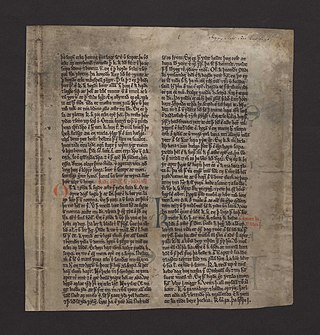
Heimskringla is the best known of the Old Norse kings' sagas. It was written in Old Norse in Iceland by the poet and historian Snorri Sturluson (1178/79–1241) c. 1230. The name Heimskringla was first used in the 17th century, derived from the first two words of one of the manuscripts.

The Grand Tour was the principally 17th- to early 19th-century custom of a traditional trip through Europe, with Italy as a key destination, undertaken by upper-class young European men of sufficient means and rank when they had come of age.
Sagas are prose stories and histories, composed in Iceland and to a lesser extent elsewhere in Scandinavia.

Eric the Victorious was a Swedish monarch as of around 970. Although there were earlier Swedish kings, he is the first Swedish king in a consecutive regnal succession, who is attested in sources independent of each other, and consequently Sweden's list of rulers usually begins with him. His son Olof Skötkonung, however, is considered the first ruler documented to definitely have been accepted both by the original Swedes around Lake Mälaren and by the Geats around Lake Vättern. Adam of Bremen reports a king named Emund Eriksson before Eric, but it is not known whether he was Eric's father. The Norse sagas' accounts of a Björn Eriksson are considered unreliable.

Sigrid the Haughty, also known as Sigrid Storråda (Swedish), is a Scandinavian queen appearing in Norse sagas. Sigrid is named in several late and sometimes contradictory Icelandic sagas composed generations after the events they describe, but there is no reliable historical evidence correlating to her story as they describe her. She is reported by Heimskringla to have been wife of Eric the Victorious of Sweden, sought as wife by Olaf Tryggvasson, then married to Sweyn Forkbeard of Denmark, but elsewhere author Snorri Sturluson says that Sweyn was married to a different woman.

The Gutes were a North Germanic tribe inhabiting the island of Gotland. The ethnonym is related to that of the Goths (Gutans), and both names were originally Proto-Germanic *Gutaniz. Their language is called Gutnish (gutniska). They are one of the progenitor groups of modern Swedes, along with historical Swedes and Geats.

The genre of travel literature or travelogue encompasses outdoor literature, guide books, nature writing, and travel memoirs.
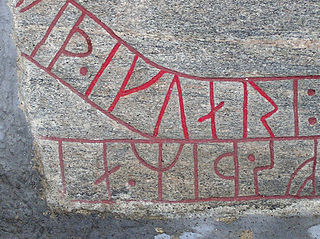
Ingvar the Far-Travelled was a Swedish Viking who led an expedition that fought in the Kingdom of Georgia.

Romanichals are a Romani subgroup within the United Kingdom and other parts of the English-speaking world. Most Romanichal speak Angloromani, a mixed language that blends Romani vocabulary with English syntax. Romanichals resident in England, Scotland, and Wales are part of the Gypsy, Roma, and Traveller community.
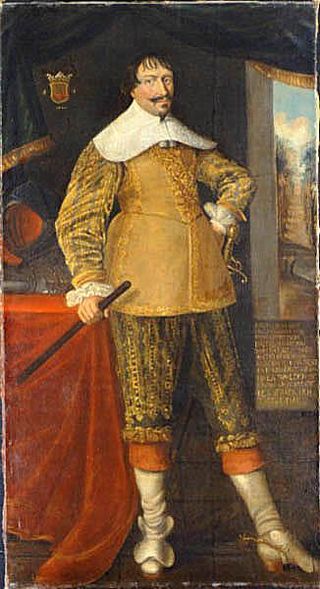
Bengt Bengtsson Oxenstierna af Eka och Lindö, Baron of Eka and Lindö, in non-contemporary sources sometimes referred to as Resare-Bengt("Bengt the Traveller"), was a Swedish diplomat and noble, Swedish Privy Councillor, and Governor-General of Ingria and Livonia. He is mainly known for his extensive travels, as he was one of the few Swedish contemporaries who travelled to Persia, Palestine and Egypt.
The Norwegian and Swedish Romanisæl Travellers are a group or branch of the Romani people who have been resident in Norway and Sweden for some 500 years. The estimated number of Romanisael Travellers in Sweden is 65,000, while in Norway, the number is probably about 10,000.
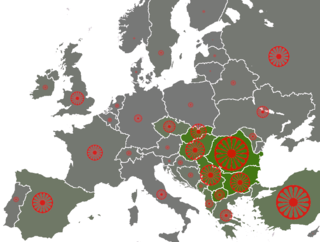
The Romani people have several distinct populations, the largest being the Roma and the Calé, who reached Anatolia and the Balkans in the early 12th century, from a migration out of the Indian subcontinent beginning about 1st century – 2nd century AD. They settled in the areas of present-day Turkey, Greece, Serbia, Romania, Croatia, Moldova, Bulgaria, North Macedonia, Hungary, Albania, Kosovo, Bosnia and Herzegovina, Czech Republic, Slovenia and Slovakia, by order of volume, and Spain. From the Balkans, they migrated throughout Europe and, in the nineteenth and later centuries, to the Americas. The Roma population in the United States is estimated at more than one million.
Scottish Travellers, or the people in Scotland loosely termed Romani persons or travellers, consist of a number of diverse, unrelated communities that speak a variety of different languages and dialects that pertain to distinct customs, histories, and traditions.
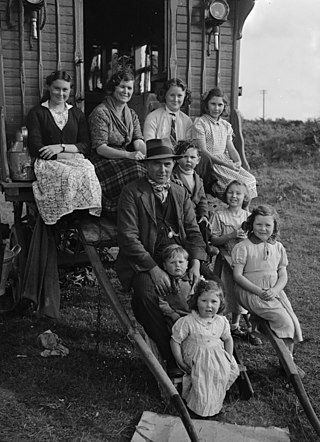
The Kale are a group of Romani people in Wales. Many claim to be descendants of Abram Wood, who was the first Rom to reside permanently and exclusively in Wales in the early 18th century, although Romanichal Travellers have appeared in Wales since the 16th century. Welsh Kale are almost exclusively found in Northwest Wales, specifically the Welsh-speaking areas. Romanichal Travellers inhabit South Wales and North East Wales.
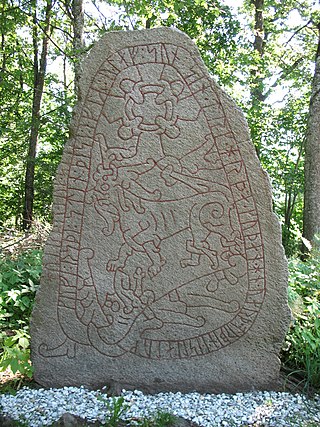
The name of Estonia has a long and complex history. It has been connected to Aesti, first mentioned by Tacitus around AD 98. The name's modern geographical meaning comes from Eistland, Estia and Hestia in the medieval Scandinavian sources. Estonians adopted it as an endonym only in the mid-19th century.
Morsarvet is a 1993 Swedish mini series directed by Staffan Roos written by, and starring, Solveig Ternström.

There are a number of traditionally itinerant or travelling groups in Europe who are known as "Travellers" or "Gypsies". The origins of the indigenous itinerant groups are unclear. They have been assumed to have taken up the travelling lifestyle out of necessity at some point during the early modern period but to not be ethnically distinct from their source population. However, recent DNA testing has shown that the Irish Travellers are of Irish origin but are genetically distinct from their settled counterparts due to social isolation, and more groups are being studied.

Bengt Göransson (1932–2021) was a Swedish educator and social democrat politician who held different cabinet posts, including minister of culture and minister of education. He also served in the Parliament for two terms between 1985 and 1991.